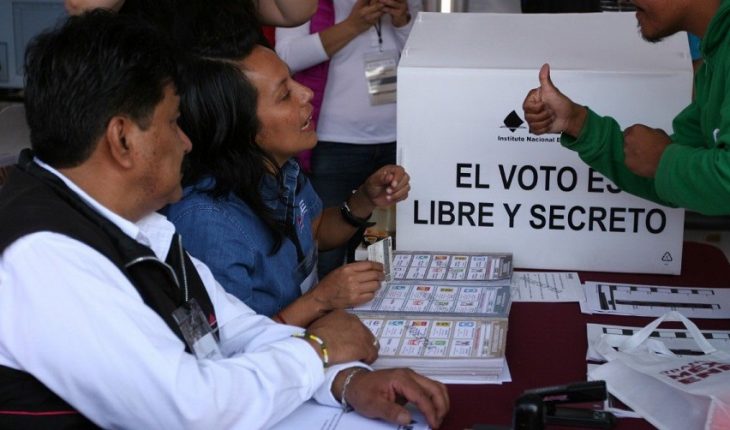This September 7 begins the federal election process 2020-2021, the largest in history by the number of positions to be renewed: more than 3,000 popular election positions in all 32 entities.
Fifteen states will elect their next governor and 30 will renovate town halls and mayors. All states will vote to elect the 300 federal deputies who will renew the Chamber of Deputies.
Find out: INE approves elections in 2 states in October, after discussion and warnings about COVID
The entities that will renew gubernaturas are Baja California, Baja California Sur, Campeche, Chihuahua, Colima, Guerrero, Michoacán, Nayarit, Nuevo León, Querétaro, San Luis Potosí, Sinaloa, Sonora, Tlaxcala and Zacatecas.
The PRI is the party with the most bernaturas, which it will try to retain, as it currently governs in eight states; is followed by the PAN that governs in four; the PRD and Morena each have a state.
In the case of the election for town halls, the only states that will not renew positions are Durango and Hidalgo. Mexico City will vote for 16 new mayors.
Campeche will also choose 22 auxiliary charges.
Hidalgo and Coahuila will have elections before the rest of the states, on October 18, 2020.
In Hidalgo, 84 town halls, composed of a municipal president and its councilors, will be renovated for a period of three years. 18 federal meps will also be voted on.
Due to the COVID-19 pandemic, campaigns in Hidalgo and Coahuila – which began this Saturday, September 5 – will no longer be as they used to be. Candidates may not make rallies of more than 50 people and in open places, or give away T-shirts, caps or steering wheeles as a vehicle for transmission of the virus.
Campaigns will now be through virtual meetings, social media, and home visits.
Coahuila will elect 38 federal deputies.
Brunette comes to elections with internal struggle
Morena will compete for the 15 bernaturas at stake for the 2021 elections amid internal struggles over the renewal of her national leadership.
On August 20, the Federal Electoral Court ordered that the National Electoral Institute (INE) should organize the survey to renew Morena’s national leadership.
This decision was described by the current party leader, Alfonso Ramírez Cuellar, as a “political assault that violates Morena’s internal life”.
However, infighting in the party began since 2019, when the renewal of national leadership was held amid accusations of irregularities in the standard and allegations of the use of the nation’s servants – officials of the Welfare Secretariat – to support nominations.
The candidates for Morena’s national leadership in 2019 were Yeidckol Polevnsky – who had held the position since 2016 – Bertha Luján, Mario Delgado and Alejandro Rojas.
Through district assemblies, Morena made her election process in October 2019, on a day marked by the cancellation of the exercises in the absence of conditions to be held.
Due to irregularities in the process, on 30 October the Superior Chamber of the Electoral Court of the Judiciary of the Federation (TEPJF) oversteald the call to the THIRD National Congress of Morena, with which the leadership would be renewed.
We established that the party’s standard was unreliable for the internal process, and that it was in breach of the credentialing process set out in its statutes, and that it was considered an irregularity only to allow those who joined Morena to participate before 20 November 2017.
Following irregularities in the internal election process and the TEPJF ruling, Morena agreed to establish a transitional cenS presidency. At the PARTY’s VI Extraordinary National Congress, held on January 26, 2020, Alfonso Ramírez Cuéllar was elected to the post.
Alfonso Ramírez Cuéllar, a federal deputy, was elected as interim or provisional president, replacing Yeidckol Polevnsky, while calling for a new internal election.
The decision was unknown to Polevnsky, who stated that the CEN is Morena’s only governing body that can establish guidelines for change of leadership.
The Electoral Court validated the election of Alfonso Ramírez Cuéllar last February, and has since held the position of national leader of Morena.
The survey to define the next national leader will be lifted from 26 September to 2 October, and the results will be released to the party on 4 October.
Gibrán Ramírez Reyes, Mario Delgado, Yeidckol Polevnsky and Alejandro Rojas Díaz-Durán will participate as candidates in the current internal process.
Opposition noted
For their part, the National Action (PAN) and Institutional Revolutionary (PRI) parties2021 in the midst of signalling various acts of corruption, according to the statement that Pemex’s former director, Emilio Lozoya, has given to the Mexican authorities in exchange for benefits in their criminal proceedings.
Emilio Lozoya denounced before the Attorney General’s Office of the Republic (FGR) an alleged transexenal fraud scheme, led by former priista presidents Enrique Peña Nieto and Carlos Salinas de Gortari, as well as the panista Felipe Calderón.
According to Lozoya Austin, for twelve years the former presidents were responsible for enriching themselves at the expense of the erario, extorting entrepreneurs in exchange for contracts and dealing influences.
Lozoya also denounced former presidential candidates Ricardo Anaya (PAN) and José Antonio Meade (PRI); former Treasury Secretary Luis Videgaray; and former panist ambassadors Francisco Javier Cabeza de Vaca (current governor of Tamaulipas), Francisco Domínguez (current governor of Querétaro), Salvador Vega Casillas, Jorge Luis Lavalle, David Penchyna and Ernesto Cordero.
Also José Antonio González Anaya and Carlos Treviño Medina, who served among other positions as directors of Pemex, and other lower-ranking officials, such as Rafael Caraveo, former Senate technical secretary who appeared in a video receiving payment from one of the alleged bribes.
In his complaint, Lozoya claimed that this scheme of personal enrichment at the cost of breaking the era began in the six-year period of Calderón, where in exchange for alleged bribes Braskem, a subsidiary of Odebrecht, was favored with the concession of the petrochemical complex Ethylene XXI, which has generated more than 3 billion pesos in losses to Pemex.
The fraud was strengthened and consolidated in peña Nieto’s six-day life with the confirmation of this work and the provision of new contracts, he noted.
He also accused other acts of corruption, such as the delivery of free fuel to the government of the priista Javier Duarte, pressure to deliver contracts to Grupo Higa as payment of the “White House” and the purchase of the Agronitrogenados junk plant from Altos Hornos.
After the accusations, all the politicians mentioned by Lozoya stated that their sayings are false and that the former pemex director will have to prove them.
Emilio Lozoya said he has evidence to support his allegations.
Who will leave the AMLO Cabinet?
President Andrés Manuel López Obrador does not rule out members of his cabinet resigning in the coming months to seek candidacy for a position of popular election.
“The election is coming and whoever wants to take that path is going to be released. I still don’t know, but they’re very likely to decide to exercise their right to vote and be voted on,” he said.
On September 3, during his morning conference, he said that anyone who wanted to “take that path” would be free to do so.
He said that at the moment all members of his team “are thoroughly applied, all of them. There is no intention in the short term to change anyone.”
So far there has been talk that the Secretary of Public Security, Alfonso Durazo and the holder of the Conade, Ana Gabriela Guevara would seek the governor of Sonora. If they did, they would have to leave office next December, six months before the election.
It has also been noted that Santiago Nieto, holder of the Financial Intelligence Unit, could contend for the government of Querétaro, and David Monreal General Coordinator of Livestock of the Sader would seek Zacatecas.
What we do at Animal Politics requires professional journalists, teamwork, dialogue with readers and something very important: independence. You can help us keep going. Be part of the team.
Subscribe to Animal Politics, receive benefits and support free journalism.#YoSoyAnimal





